Introduction: Understanding the Struggles of an Overtired Newborn
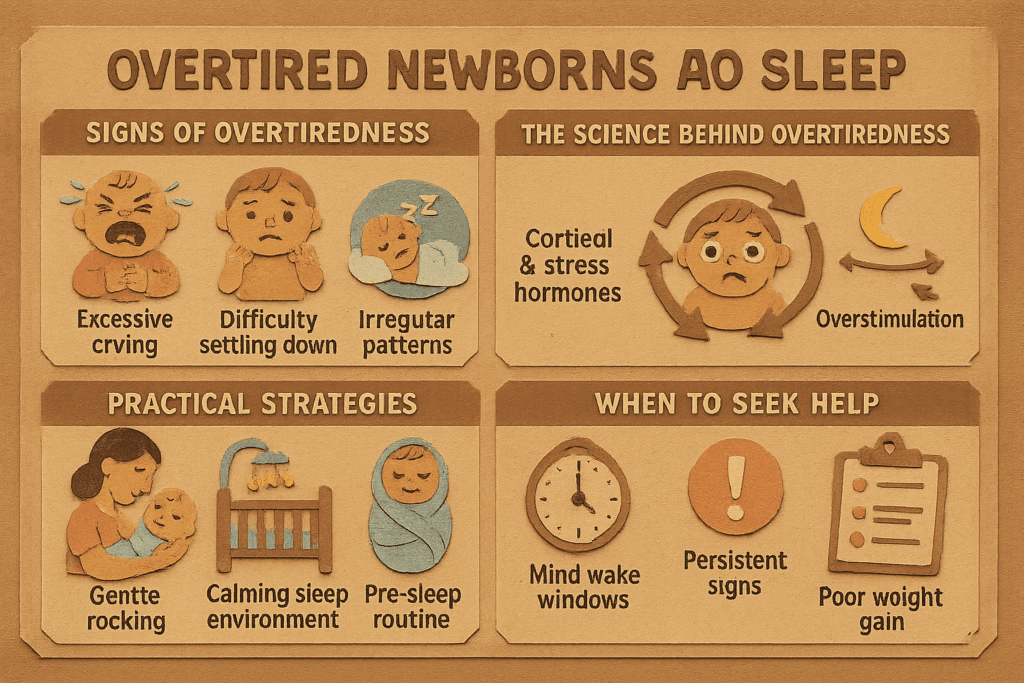
If you’ve ever spent the night pacing with a fussy, overtired newborn who just won’t sleep, you’re not alone. Many parents face the same challenge of how to get an overtired newborn to sleep when their baby is too exhausted to settle down. It can feel overwhelming and emotionally draining, especially when your baby’s exhaustion seems to make sleep even harder to achieve.
Overtiredness is a common issue for newborns and happens when they stay awake for too long. When a baby becomes overtired, their body becomes overstimulated, making it difficult for them to relax enough to sleep. Parents often find themselves in a frustrating situation, trying to figure out how to get an overtired newborn to sleep while their baby’s tiredness intensifies the struggle.
The challenge of how to get an overtired newborn to sleep doesn’t just affect your baby—it also takes a toll on parents. Sleep deprivation can leave you feeling drained, stressed, and at a loss for how to help your baby. The emotional and physical exhaustion of trying to soothe a fussy baby can make it feel like the night will never end.
In this article, we’ll guide you through how to get an overtired newborn to sleep by providing proven strategies to help calm your baby and promote restful sleep. With the right techniques, you can break the cycle of overtiredness and help your baby rest easier.
By understanding the root causes of overtiredness and learning how to get an overtired newborn to sleep, you’ll be better prepared to handle those sleepless nights. Patience, consistency, and the right approach can restore peace to your home and help your baby sleep soundly once again.
Table of Contents
The Science Behind Overtiredness in Newborns
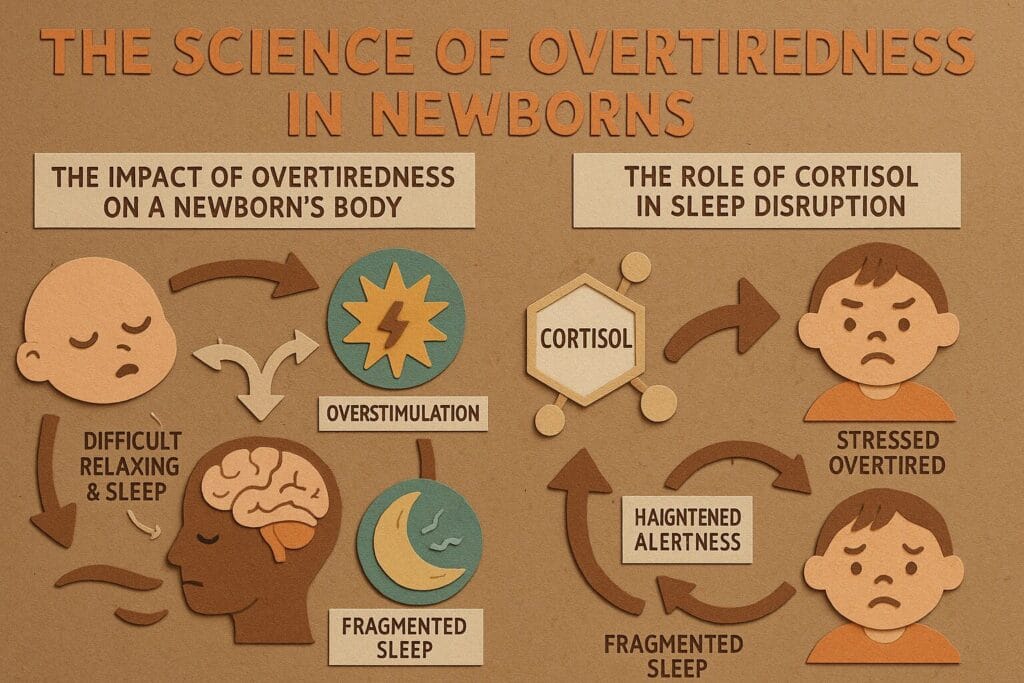
Before diving into solutions, it’s important to understand how to get an overtired newborn to sleep and why overtiredness in newborns leads to so much trouble with sleep. The science behind overtiredness can provide valuable insights into why it’s so difficult for your baby to fall asleep once they are too tired, and how you can effectively address this issue.
A. The Impact of Overtiredness on a Newborn’s Body
When a newborn becomes overtired, their body experiences a stress response, which makes it harder for them to calm down and fall asleep. This stress response directly affects how to get an overtired newborn to sleep because the body is too overstimulated to relax. The more your baby stays awake, the more challenging it becomes for them to unwind, creating a cycle that makes it even harder to settle down.
As their body releases stress hormones, such as adrenaline, the natural sleep mechanisms are disrupted, making sleep elusive. Understanding this process is key to finding ways to help your baby relax and sleep, especially when they’re overtired.
B. The Role of Cortisol in Sleep Disruption
Cortisol, a hormone associated with stress, increases when a baby is overtired, complicating how to get an overtired newborn to sleep. High cortisol levels make it harder for babies to relax enough to fall into a restful sleep. When cortisol is elevated, your baby’s body enters a heightened state of alertness, making it much more difficult for them to settle into a calm, sleepy state.
This stress hormone prevents your baby from entering deeper stages of sleep, which they need to feel rested. The increase in cortisol levels further emphasizes the importance of managing overtiredness early on to make how to get an overtired newborn to sleep more effective.
Wondering if babies sleep more when they’re sick? Explore the surprising reasons behind this and learn helpful tips to comfort your baby in our full guide: Do Babies Sleep More When Sick? 5 Surprising Reasons and Tips for Comforting Your Baby.
III. Signs That Your Newborn is Overtired
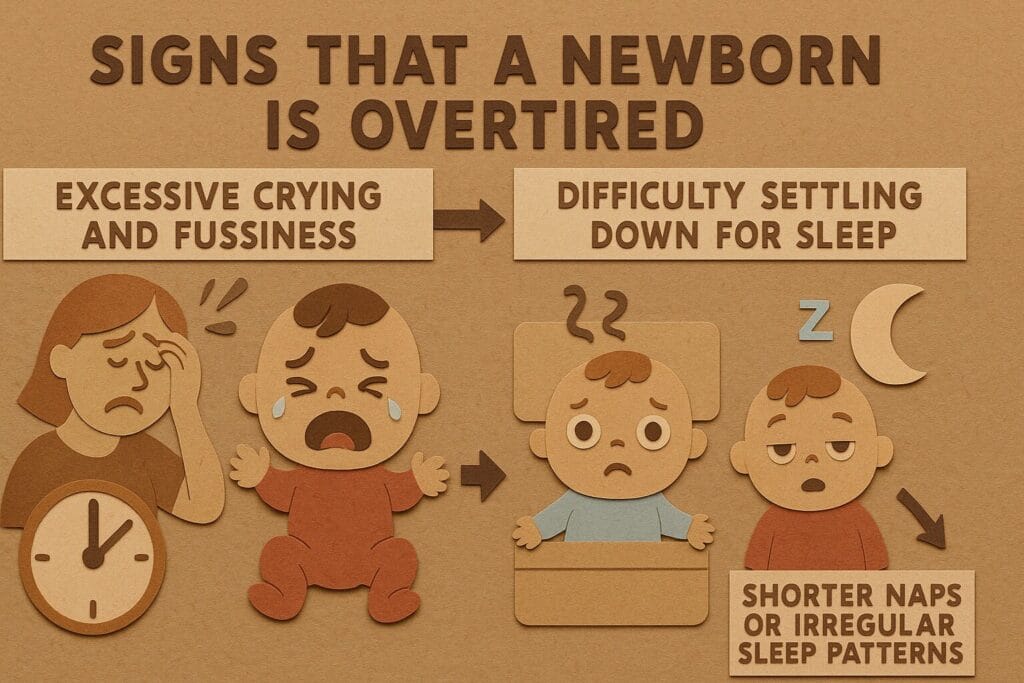
Knowing when your baby is overtired can help prevent a difficult sleep situation from getting worse. Recognizing these signs early is crucial and can be the first step in how to get an overtired newborn to sleep. By understanding the indicators of overtiredness, you can intervene sooner and avoid the frustration of trying to soothe an already overtired baby.
A. Excessive Crying and Fussiness
Overtired babies are often more fussy than usual, and this crying can become harder to soothe as the sleep pressure builds. This heightened irritability makes how to get an overtired newborn to sleep even more difficult. When a baby is overtired, their ability to calm down diminishes, and they may cry inconsolably. Recognizing this as a sign of overtiredness can help you respond appropriately before the situation escalates further.
B. Difficulty Settling Down for Sleep
If your baby is consistently resisting sleep or seems unable to calm themselves, they may be overtired, making how to get an overtired newborn to sleep even more challenging. Newborns are naturally sleepy, but when they’re overtired, their bodies can’t relax enough to drift off easily. If you notice your baby fighting sleep, it’s a sign that they may need help settling down before their overtiredness makes the process harder.
Curious about why your baby sleeps with their arms up? Find out the reasons behind this natural behavior and what it means for your baby’s sleep in our full guide: Why Do Babies Sleep With Their Arms Up.
C. Shorter Naps or Irregular Sleep Patterns
Babies who struggle with long naps or have erratic sleep patterns may be showing signs of overtiredness, which can directly impact how to get an overtired newborn to sleep. Overtired babies tend to sleep in shorter bursts and may wake up frequently during the night, which leaves them even more exhausted and more difficult to put down. Keeping track of your baby’s sleep patterns can help you recognize when they’re becoming overtired and provide an opportunity to prevent further disruptions.
IV. How Overtiredness Affects Sleep for Parents and Babies
The cycle of overtiredness isn’t just tough on your baby; it also leaves parents feeling exhausted and overwhelmed. This exhaustion can make it even harder to figure out how to get an overtired newborn to sleep. The stress and fatigue parents experience can exacerbate the situation, making the task of helping your baby sleep seem even more daunting.
A. The Effect of Overtiredness on Baby’s Sleep Cycle
Overtired babies often experience fragmented or restless sleep, which can make the process of falling asleep even harder. This disruption in their sleep cycle emphasizes why it’s so important to learn how to get an overtired newborn to sleep. When babies are overtired, they tend to wake up more frequently and struggle to stay in deeper stages of sleep. This leads to a more disrupted and less restful sleep experience for your baby, further compounding the challenge of getting them to sleep soundly.
B. The Emotional Toll on Parents
Trying to soothe an overtired baby can be emotionally draining, leading to increased stress for parents. The ongoing frustration of dealing with a fussy, exhausted baby can make it feel like how to get an overtired newborn to sleep is an insurmountable task. Parents often experience feelings of helplessness and fatigue, which can increase stress levels and make the entire sleep process feel overwhelming. The emotional toll adds another layer of difficulty in breaking the cycle of overtiredness, making it all the more crucial to find effective strategies to help both you and your baby get the rest you need.
V. Practical Strategies to Help Your Overtired Newborn Sleep
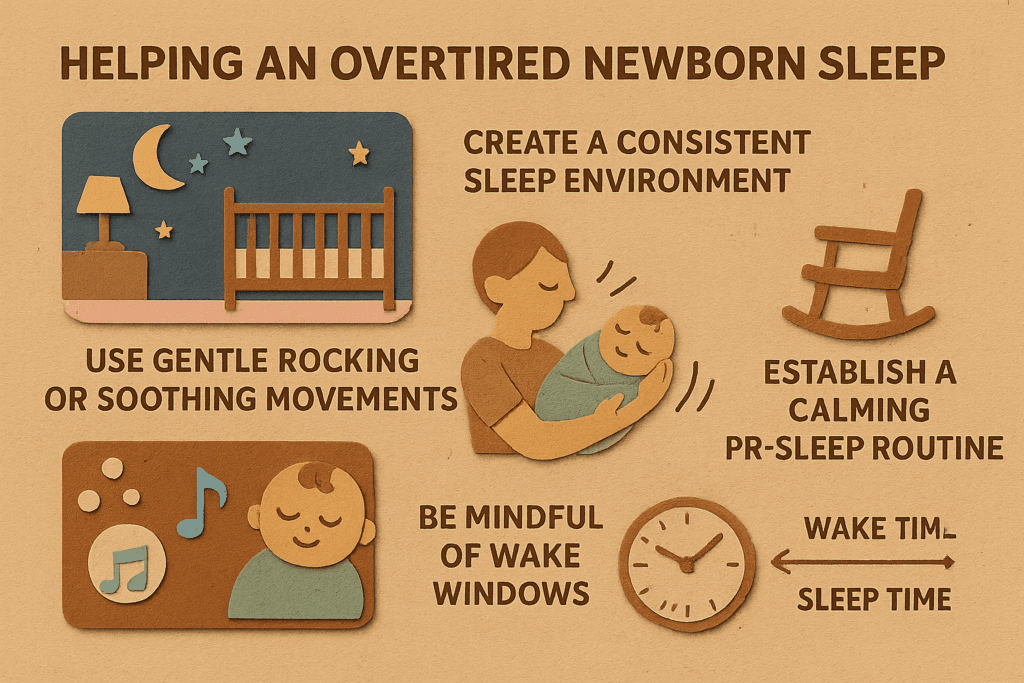
Fortunately, there are a number of techniques that can help soothe an overtired baby and restore their sleep routine, making it easier for you to learn how to get an overtired newborn to sleep. These strategies focus on creating a calm environment and establishing routines that promote better sleep, even when your baby is exhausted and struggling to settle down.
A. Create a Consistent Sleep Environment
A calm and consistent sleep environment is key to helping your baby wind down, even when they’re overtired. A soothing environment signals to your baby that it’s time to rest, and it plays a crucial role in how to get an overtired newborn to sleep. Keep the room dark, quiet, and cool to encourage relaxation. Consistency is important, so make sure the environment remains the same for each nap and bedtime to help your baby associate it with sleep.
B. Use Gentle Rocking or Soothing Movements
Gentle rocking or swaddling can help calm your baby’s nervous system, encouraging them to settle into sleep. These soothing movements provide comfort, reduce tension, and create a sense of security that makes it easier for your baby to relax. This method plays a significant role in how to get an overtired newborn to sleep by giving your baby the comfort they need to drift off, even when they’re overstimulated from being awake too long.
C. Establish a Calming Pre-Sleep Routine
A pre-sleep routine, such as a warm bath, a gentle massage, or a quiet lullaby, can signal to your baby that it’s time for sleep, even if they’re overtired. Establishing a calming routine helps your baby relax and prepares them for rest, which is a key component in how to get an overtired newborn to sleep. Consistency in the routine allows your baby to start recognizing cues for sleep and improves their ability to transition into a restful state.
Is your 7-month-old struggling to sleep through the night? Discover the common reasons and helpful tips in our detailed guide: Why Your 7-Month-Old Not Sleeping Through the Night (And How to Help).
D. Be Mindful of Wake Windows
Keep an eye on your baby’s wake windows — the ideal amount of time they can stay awake between naps. This is crucial in preventing overtiredness from building up in the first place, which directly impacts how to get an overtired newborn to sleep. By being mindful of how long your baby is awake before sleep, you can help prevent them from becoming overtired and avoid the challenges that come with trying to get them to sleep when they’re too exhausted to settle.
VI. When to Seek Help: Consulting Your Pediatrician
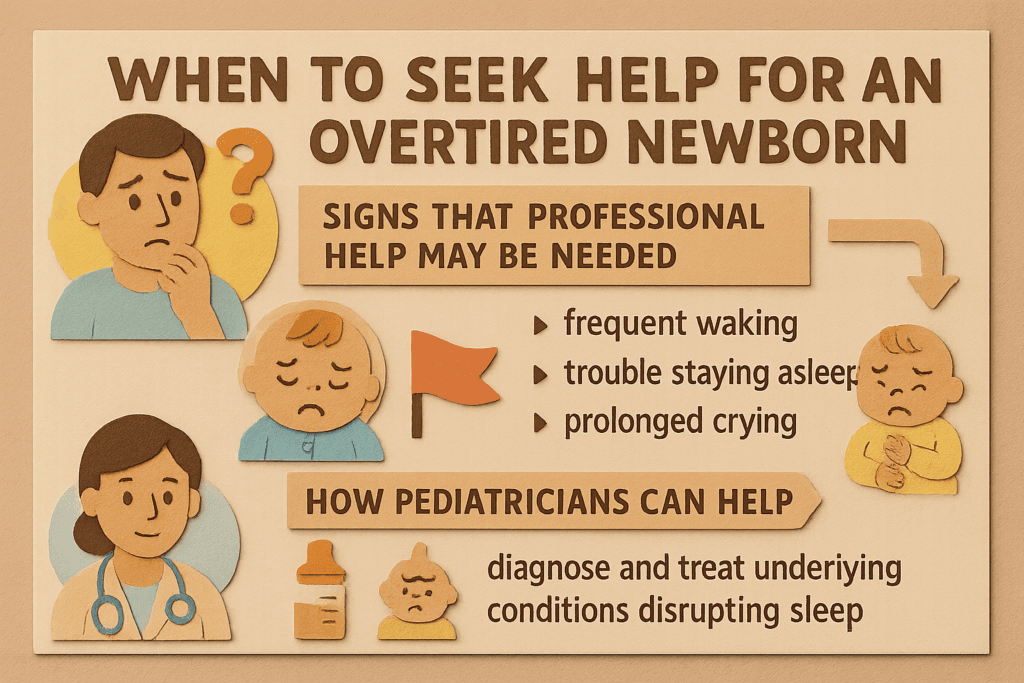
If your baby’s overtiredness persists or is accompanied by other concerning symptoms, it may be time to consult with your pediatrician for advice on how to get an overtired newborn to sleep. While many sleep issues can be resolved with the right techniques, a pediatrician can help identify any underlying conditions that might be contributing to your baby’s sleep struggles.
A. Signs That Professional Help May Be Needed
If your baby has trouble sleeping consistently, or their sleep patterns are significantly disrupted, it could be worth seeking professional advice on how to get an overtired newborn to sleep. Persistent sleep issues, such as trouble staying asleep or falling asleep, despite trying various soothing methods, may indicate that there’s more going on than just overtiredness. Consulting a pediatrician can help you understand whether there’s an underlying medical concern that needs attention.
B. How Pediatricians Can Help
Your pediatrician can help determine if there’s an underlying issue affecting your baby’s sleep, such as reflux or colic, that could be making how to get an overtired newborn to sleep more difficult. They can provide guidance on specific treatments or strategies to manage these conditions, ensuring that your baby’s sleep issues are addressed appropriately. With their help, you can ensure your baby’s sleep difficulties are properly managed and improve their overall well-being.
FAQS
1. How do I know if my newborn is overtired and needs help sleeping?
If your newborn is showing signs like excessive crying, irritability, difficulty settling down, or shorter naps, they might be overtired. Recognizing these signs early can be the first step in how to get an overtired newborn to sleep more effectively.
2. What are some common mistakes parents make when trying to get an overtired newborn to sleep?
One common mistake is waiting too long to help your baby sleep. The longer your newborn stays awake, the more overstimulated they become, making it harder for them to sleep. Learning how to get an overtired newborn to sleep involves watching for early signs of tiredness and acting promptly.
3. How can I create a calming sleep routine to help my overtired newborn sleep?
A calming pre-sleep routine, such as a warm bath, gentle rocking, or soft lullabies, can help signal to your baby that it’s time to sleep. Establishing this routine is a crucial part of how to get an overtired newborn to sleep.
4. Does swaddling help an overtired newborn sleep better?
Yes! Swaddling can be an effective technique for how to get an overtired newborn to sleep. It mimics the feeling of being in the womb and provides comfort, helping your baby feel secure and relaxed enough to sleep, even when overtired.
5. How long should I let my newborn sleep during the day to avoid overtiredness at night?
It’s important to balance your baby’s naps during the day. Too little sleep can lead to overtiredness, making how to get an overtired newborn to sleep at night harder. Newborns typically need 14-17 hours of sleep per day, spread across naps and overnight sleep.
6. What can I do if my overtired newborn refuses to sleep?
If your baby refuses to sleep despite your efforts, try calming techniques like gentle rocking, swaddling, or soothing sounds. These methods help in how to get an overtired newborn to sleep by calming their nervous system and preparing them for rest.
7. Should I let my overtired newborn cry themselves to sleep?
While it’s important to let your baby learn how to fall asleep on their own, letting an overtired newborn cry excessively can be distressing and make it harder to settle. Instead, gently comfort them and use techniques like rocking or swaddling to guide them to sleep.
8. How can I prevent my newborn from becoming overtired during the night?
To prevent overtiredness at night, make sure your baby is getting enough naps during the day. Keep nighttime feedings and sleep routines consistent, and watch for signs of tiredness so you can start the bedtime routine early, helping to ensure how to get an overtired newborn to sleep more easily.
9. Can overtiredness cause my newborn to sleep poorly at night?
Yes, overtiredness can lead to fragmented or restless sleep, making it harder for your newborn to stay asleep for long periods. Learning how to get an overtired newborn to sleep by addressing overtiredness during the day can help improve nighttime sleep.
10. When should I consult a pediatrician if my baby is overtired?
If your newborn’s overtiredness persists despite trying various techniques, or if there are signs of an underlying condition (such as reflux or colic), it may be time to consult a pediatrician for advice on how to get an overtired newborn to sleep. A pediatrician can help rule out medical issues that could be affecting your baby’s sleep.
VII. Conclusion: Helping Your Newborn Sleep Better, One Step at a Time
With patience, consistency, and the right strategies, you can help your overtired newborn get the rest they need — and in turn, restore peace to your own nighttime routine by understanding how to get an overtired newborn to sleep. By recognizing the signs of overtiredness early and implementing effective techniques, you can break the cycle of exhaustion and improve both your baby’s sleep and your own.
Remember, helping your baby sleep better doesn’t happen overnight. It requires time, effort, and understanding of the unique needs of an overtired newborn. By consistently applying the right strategies, you’ll be able to help your baby relax, rest, and develop healthier sleep habits.
Ultimately, learning how to get an overtired newborn to sleep can make all the difference in creating a restful and peaceful sleep environment for both you and your baby. Keep at it, and soon you’ll see the positive results in your baby’s sleep pattern and your own well-being.



